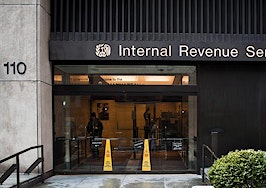To clear up much confusion over the new Tax Cuts and Jobs Act of 2017’s impact on homeowners, buyers and investors, here’s a recap of eight top real estate winners and losers.
This summary can help you understand the big-picture impacts of the new tax plan so you can address your clients’ concerns and advise them.
You will also see what is driving more existing homeowners to stay in their current location. So, let’s take a closer look:
The winners
1. Real estate investors with positive cash flow
If you are a real estate investor, you are by far the biggest winner because you can still write off “all the expenses of owning and running a rental because the properties are considered a business,” according to CNBC.
Deductions include the interest on mortgages, maintenance costs and management costs from the income the property produces. Your real estate “business” may also benefit from the new 20 percent pass-through rate on small businesses.
2. First-time buyers
New homebuyers with a mortgage under $750,000 (new cap for home mortgage interest deduction) will feel little to no impact. According to realtor.com, the median household price nationally is $270,000, which means the majority will still get their full mortgage interest deduction.
3. Middle-income homeowners, buyers and sellers
Those who live in the South or West where houses are priced moderately, and State and Local Income Taxes (SALT) are low or non-existent, are real estate winners. With lower home prices, homeowners, buyers and sellers can all still benefit from most of the previous deductions.
4. Existing homeowners
Homebuyers who bought their homes before the new tax went into effect are grandfathered into the previous mortgage interest deduction cap of $1 million.
The result might be that many of these homeowners stay in their home longer because it will increase their expenses to move. And people with historically low interest rates locked in also have an incentive to stay put.
And because moving expenses are no longer deductible, it’s another reason not to move.
The losers
1. Renters
Renters may be one of the biggest losers from the new tax plan. If fewer people can afford to buy a home, rents are likely to rise.
With more millennials and baby boomers renting now, there will be a greater demand for rentals. And this increased preference to rent versus own will drive rents up.
2. Upper-middle class and luxury buyers
The new $750,000 cap on the mortgage interest deduction (versus previous $1 million cap) could be an issue for the upper-middle class.
The reduced mortgage interest rate deduction will especially impact people living in high-priced markets and luxury buyers everywhere else in the country. Owning a high-priced home is going to be a lot more expensive under the new law, unless you are an investor.
3. Homeowners in coastal blue states
Because you are now limited to a $10,000 deduction in State and Local Income Tax (SALT), the coastal state residents with high SALT tax will no longer benefit from this deduction.
Residents in New York and California will be most negatively impacted, while people living in Florida and Texas will not be impacted because they don’t have state taxes.
4. Homeowners seeking equity loans
For anyone looking to use their homeowner equity for a loan, there will be more scrutiny over the reason. Homeowners used to be able to deduct up to $100,000 for HELOC (home equity line of credit).
HELOC loans for things like a new car or vacation are no longer deductible. And in other cases, only a portion of the loan will be deductible.
According to Forbes, “For the tax years 2018 through 2025, you will not be able to deduct HELOCs.” There are a few exceptions. Equity loans must be used to “buy, build or substantially improve” the residence to be considered deductible.
In addition, home equity loans used for a business or investing could be deductible as business or investment expense.
And with the likelihood of interest rates rising, it will create a sense of urgency to buy or invest in real estate. And in the long run, high interest rates will create less movement and more renters.
As a result, the biggest real estate winners by far are the investors who rent and have positive cash flow.
Tom Wheelwright is the author of “Tax-Free Wealth,” CPA and CEO of WealthAbility. You can follow him on Facebook or Twitter.













